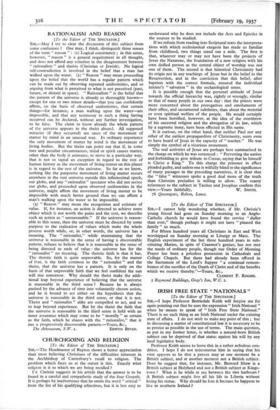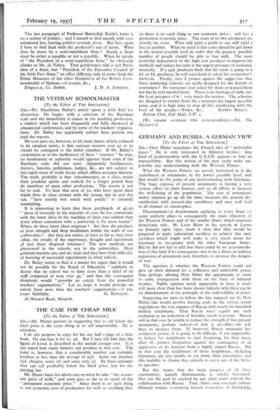IRISH FREE STATE " NATIONALS "
[To the Editor of THE SPECTATOR.]
SIR,—I hope Professor Berriedale Keith will forgive me for again pointing out that he uses the expression" Irish National" when he- means to speak of - " Irish Free State National." There is no such thing as an Irish National under the existing state of affairs. I do not wish to make any point of this ; but in discussing a matter of constitutional law it is necessary to be as precise as possible in the use of terms. The main question, as put in my former letter, is whether a natural-born British subject can be deprived of that status against his will by any local legislative body.
Professor Keith seems to leave this in a rather nebulous con- dition. I hope I do not 'misconstrue himi in saying that his view appears to be that a person may at one moment be a British subject, and at another 'moment not a British subject. Does he suggest that, for instance, Mr. Bernard Shaw is a British subject at Holyhead and not a British subject at Kings- town ? What is he while at sea between the two harbours? A British subject might live all his life in Liberia without losing his status. Why should he lose it because he happens to live in southern Ireland ? The last paragraph of Professor Berriedale Keith's letter is on a matter of politics ; and I intend to deal merely with can- stitutional law, leaving politics severely alone. But here again 1 have to find fault with- the professor's use of terms. What does he mean by a semi-republican State ? Surely a State must be either a republic or not a republic. When he speaks of "the President of a semi-republican State," he obviously alludes to Mr. de Valera. That gentleman's title is not Presi- dent of a State, but "President of the Executive Council of the Irish Free State," an office differing only in name from the Prime Ministers of the other Dominions of the British Com- monwealth of Nations.—I remain, &e.,
Kingstovn, Co. Dublin. J. D. A. JoHNsox.















































 Previous page
Previous page